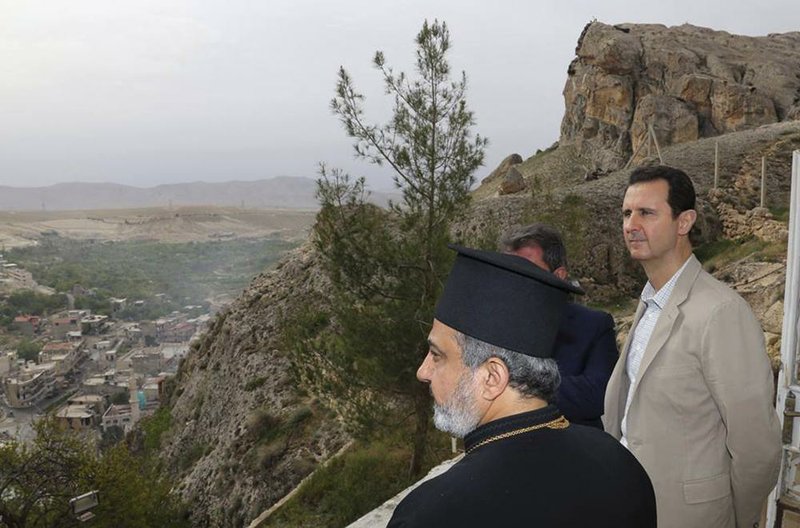BEIRUT - Syria’s president marked Easter with a tour Sunday of an ancient Christian village recently recaptured by his forces, state media said, as the country’s Greek Orthodox patriarch vowed that country’s Christians “will not submit and yield” to extremists.
Syrian state TV and the country’s official SANA news agency said President Bashar Assad visited the hilltop hamlet of Maaloula, inspecting the damage done in recent fighting to its monasteries and churches.
Rebels, including fighters from the al-Qaida-affiliated Nusra Front, seized Maaloula several times late last year, most recently in December. Government troops swept through the village Monday, sending rebel fighters fleeing to nearby hills.
Maaloula is some 40 miles northeast of Damascus and is home to a large Christian population. The army’s triumph in the village was an important symbolic prize for the government in its quest to be seen as protector of religious minorities, including Syria’s Christians, who have largely supported the Assad family’s decades of rule.
During his visit to the village Sunday, Assad promised to defend Christians - who make up about 10 percent of Syria’s prewar population of 23 million - and protect churches that he said were part of the country’s cultural heritage.
“Nobody, regardless of the extent of their terror, can erase our cultural and human history,” the state news agency quoted Assad as saying as he surveyed damage to the Mar Takla Greek Orthodox monastery. Despite damage to holy sites in the village, Assad told state TV that “Maaloula will remain steadfast in the face of barbarism of all those who are targeting the homeland.”
Assad’s forces and rebels trying to overthrow him are locked in a civil war in which more than 150,000 people have been killed. Millions more have been driven from their homes during the 3-year-old conflict.
In comments to mark Easter, Patriarch John Yazigi called on the warring sides to end the practice of “intimidation, displacement, extremism and takfiri mentality,” a term for Islamic extremists. Such radicals have become increasingly influential among rebels, attacking Christians - whom they see as infidels - partly as punishment for their support of Assad.
Yazigi called for dialogue and reconciliation, hailing Syria as a home for Muslims and Christians alike. But he said there would be no reckoning with Islamic extremists, vowing that “we will not submit and yield to those who transgress against our people and holy places.”
Syria’s conflict started in March 2011 as largely peaceful protests against Assad’s rule.It gradually turned into a civil war after some opposition supporters took up arms to fight a brutal government crackdown on dissent. The fighting has taken on increasingly sectarian overtones over the past year, pitting Sunni Muslim rebels against Assad’s government that is dominated by Alawites, an offshoot sect of Shiite Islam to which the president’s family also belongs.
In Damascus, four people, including two children, were killed in two separate attacks Sunday, SANA said. At least 11 people were wounded when mortar shells exploded in the Umayyad and Arnous squares around noon.
Also Sunday, four French journalists kidnapped and held for 10 months in Syria returned home. The joyful families of the four - Edouard Elias, Didier Francois, Nicolas Henin and Pierre Torres - were greeted by President Francois Hollande in an informal welcome ceremony Sunday morning.
Hollande praised Turkish authorities for helping in the journalists’ return, but didn’t elaborate. It was unclear whether Turkey played a role in the negotiations to obtain the journalists’ freedom. The four were released at the Turkish-Syrian border and found by Turkish police.
The four were kidnapped in two separate incidents last June, and it was unclear how much time they spent together. Since his capture, Francois said he felt like he had been living in a “black hole … in basements without seeing daylight, including a month and a half chained one to another.”
Hollande insisted that France honored its policy of not paying ransoms.
“It’s a very important principle so that hostage-takers are not tempted to capture others,” Hollande told Europe 1. He stressed the role of negotiations and intelligence work - as he has in the past when hostages were freed, notably in Mali, where two French remain in captivity.
More than a dozen people, including two bishops and a priest, are still missing in Syria after they are believed to have been abducted by extremists in the rebel-controlled north.
Information for this article was contributed by Diaa Hadid, Elaine Ganley and Catherine Gaschka of The Associated Press.
Front Section, Pages 4 on 04/21/2014

